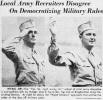
ALUMNI OF OFLAG 64 MEET
Capt. William T. Kelso, left, reminisces with MSgt. Leon E.
Lavender at Binghamton Army Recruiting Station. The captain lost 69
pounds and the sergeant 47 pounds while prison mates in a German
prison camp in Poland.
 Former Prison Mates in Reich Are Reunited in Binghamton Former Prison Mates in Reich Are Reunited in Binghamton
An odd quirk of fate has reunited at Binghamton Army Recruiting Station
two men
who suffered may days of misery
together in a German prison camp.
Both were captured during the Normandy campaign and spent almost a
year together at Oflag 64 in Poland.
Capt. William T. Kelso, 29, of Syracuse today discovered on his arrival
here for recruiting duty that MSgt. Leon E. Lavender, of the Binghamton
Recruiting Station, was a prison mate in the same camp. Sergeant Lavender
was a first lieutenant in the 82d Airborne Division when captured soon
after D-Day.
Landed on D-Day
A platoon leader in the 26th Regiment of the 1st Division, Captain Kelso
landed D-Day in Normandy and went through the bitter fighting that led
up to the St. Lo breakthrough.
He was captured Aug. 1, 1944, near Mortain.
"We were driving down a road four jeeps in a line. We were supposed,"
said the captain "ruefully, "to be behind our lines." "The next thing
I knew I was marching, down the road with a rifle in my back and someone
yelling German at me," he said.
Lives on Scanty Diet
Diet at his camp consisted of a loaf of bread a day and a bowl of soup
every three days with some horse meat once a week according to the captain.
"Doctors in our camp figured it to be 1,200 calories a day," he said.
"Red Cross packages kept us from starving," Captain Kelso said.
Now weighing 193 pounds, he dropped to 124 pounds while in the camp.
The prisoners were ordered out of their camp a day before the Russians arrived.
They marched an average of 15 miles a day, the captain said.
After 28 days consecutive marching, Captain Kelso's legs and feet became
so swollen that the Germans transported him the rest of the trip in
a boxcar to Camp Luckenwold, near Berlin.
"During the march I was issued only three loaves of bread," he said.
He explained that the prisoners kept alive by stealing barley and potatoes
from farms along the route of march.
April 22, 1945, he was liberated by the Russians.
"Those Russians are pretty who suffered many days of prison camp. rough boys
I wouldn't like to have to fight them," he reminisced.
Even when back in this country Captain Kelso found it hard to overcome
the after effects of his confinement. "Eating was difficult," he said.
"I had to take it easy because my stomach had shrunk and I would feel
full after a few bites or food."
Captain Kelso is married to the former Mrs. Barbara E. Hall of Waverly.
He hopes to be assigned to a vacancy in the recruiting station at Elmira,
near his wife's home.
[Press and Sun-Bulletin, Binghamton, NY, 11 May 1946,
Sat, Main Edition, Page 3]

Lavender Gets Former Rank As
Lieutenant
New problems getting another place to live and buying new uniforms
today faced MSgt. Leon E. Lavender of Binghamton Army Recruiting
Station.
But they were problems he faced with a light heart.
Once a German prisoner of war and presently "top kick" of the local
recruiting .station, the sergeant has received orders
reappointing him to his former rank of first lieutenant and
assigning him to his former outfit, the 82d Airborne Division.
Tuesday he will be discharged as an enlisted man and will leave for
the Ft. Bragg, N. C, headquarters of his division. He has been
given a temporary wartime commission but intends to apply for a
permanent commission in the regular army.
Paratroop Officer
Sergeant Lavender was a paratroop lieutenant D-Day and fought
through the first six days of the Normandy invasion before his
capture. While a Nazi captive he suffered rubber hose beatings,
solitary confinement and starvation diets in addition to the
experience of being bombed by Allied, planes.
After his release by Russian troops and his return to this country
May 29, 1945, the sergeant was given 63 days rehabilitation
leave. This was followed by his terminal leave and discharge
Dec. 30,1945, when he reenlisted as a master sergeant at the
Binghamton Recruiting Station. "I sold all my uniforms when I
reenlisted --- thought I'd have no further use of them," he
said.
[Press and Sun-Bulletin, Binghamton, NY, 07 Sep 1946, Sat, Main Edition, Page 3]
|
 Local
Army Recruiters Disagree On Democratizing Military Rules Local
Army Recruiters Disagree On Democratizing Military Rules
HIYAH,
SIR! The "Yes, Sir, right away, Sir," school of strict army
discipline is exemplified, left, by MSgt. Leon E. Lavender, top kick
at Binghamton Army Recruiting Station. At right he shows the "Hiyah
General" approach that will be the order of the day off military
posts.
-Photo by The Binghamton Press
 Should an enlisted man be required to salute an officer on a crowded
sidewalk? Should officers accrue unused leave time and receive
terminal pay upon discharge while enlisted men forfeit all unused
leave time?
Should an enlisted man be required to salute an officer on a crowded
sidewalk? Should officers accrue unused leave time and receive
terminal pay upon discharge while enlisted men forfeit all unused
leave time?
To these and several other G.I. complaints, the army, through
Secretary of War Patterson, has announced a loud "NO."
Personnel of the Binghamton Army Recruiting Station today countered
with opinions ranging from a "yes" to "maybe" to "no."
"I think it's the bunk!" said 1st Sgt. Leon E. Lavender, of the
order abolishing all saluting except on military posts and in
occupied areas overseas.
Growled the first sergeant, who also served as a first lieutenant
while a paratrooper in combat: "I never broke my arm saluting an
officer."
Says Discipline Suffered
Concurring with him was SSgt. Ernest W. Lee who explained that he
always saluted not the individual but his uniform and what it
represents.
Capt. W. A. McAdam, station commander, recalled an experiment at
Pine Camp in 1942 when saluting was minimized and general discipline
immediately suffered as a result.
On the negative side stood Maj. Howell P. McCorkle, head of the
Binghamton
Recruiting District. and Sgt. Lloyd F. Holtslander. They both
thought there is too much unnecessary saluting now.
Paradoxically, while the officers unanimously agreed that enlisted
men should have equal rights on terminal pay leave, the enlisted men
were equally unanimous in their disapproval.
End of 3-Day Passes
Discharged veterans, principally, will gain from the change, was
the general opinion. For regular army men, the enlisted personnel
explained, the new rule would mean the end of three-day passes.
Instead of occasional furloughs and frequent three-day passes over
weekends, enlisted men will have to follow the officers' procedure
and wait for leave time to accrue. Sergeant Lavender summed up the
issue when he declared: "What would I do with 30 days leave? I can
spend all the money I've got on a three-day pass."
The whole staff agreed upon the War Department's recommendation
that social facilities for enlisted men should be improved. SSgt.
Thomas E. Watson added the opinion that the army should eliminate
the social distinctions now observed between the families of
officers and enlisted men.
Deplore '90-Day Wonders
Opinion also was unanimous that officers should receive more
training than that acquired by wartime "90-day wonders."
"This is especially true in the infantry where officers must be
leaders of men," declared Sergeant Watson. Sergeant Holtslander
observed: "I have been under some pretty bum officers."
One other phase in the new order is the elimination of an existing
requirement that officers wear distinctive uniforms, live apart from
their men in garrison, and confine their social contacts to other
officers.
While both officers at the recruiting station admitted that it
would be no hardship to eat at the same mess, live in barracks with
enlisted men, and wear similar uniforms, the enlisted men split two
and two on the idea.
'Kill All Ambition'
Once more leading the opposition, Sergeant Lavender declared that
elimination of special privileges and the elements of prestige would
kill all ambition in the army.
"That's what you work for," he said. "If they put me in the same
class as a private, I'd quit."
Sergeant Lee agreed that officers should receive more than heavier
pay envelopes for the work they must do to achieve their position.
"Too many privileges, too many advantages, and some officers use
their rank too much," commented Sergeant Holtslander.
Major McCorkle expressed the belief that much of the present
dissension stems from such typical rules in the Officers' Handbook
which require that officers should not be seen pushing baby
carriages and never should carry bundles for their wives.
[Press
and Sun-Bulletin, Binghamton, NY,
02 Jul 1946, Tue, Main
Edition, Page
3] |











